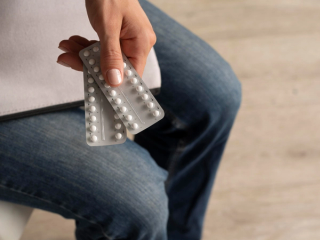
- Home
- Advice Hub
- Conception
- Trying To Conceive
- Guide To Conception Vitamins
Guide to Conception Vitamins
Learn about which conception vitamins increase your fertility chances. Learn which nutrients support reproductive health and enhance chances of conception.
If you’re trying to conceive, it’s likely that you’ve started investigating which fertility supplements you should take to help boost your fertility. With so many supplements advertised online and on social media, it can be difficult to cut through the noise and know which ones you should take and which ones to avoid.
One thing is for sure however, the best way in which to get all the nutrients you need is through a healthy balanced diet, and then top up with a good conception supplement to make sure you’re getting all you need to support your trying to conceive journey.
Can preconception vitamins really help you to conceive?
Preconception supplements form just part of what you can do to optimise your fertility and reduce the time it takes you to conceive. Enjoying a healthy diet and exercise, not smoking or drinking alcohol and looking after your sexual health are also vital components of a healthy conception plan. However, there are specific supplements recommended by the NHS, such as folic acid and Vitamin D1, for pregnancy.
To help you understand more, and so that you can make an informed decision on the supplements you might like to consider, we’ve listed the ones which are commonly taken. We also provide you with an insight in to why these supplements are important for conception and what the research tells us about fertility supplements.
When is the best time to start taking conception vitamins?
Ideally, as soon as you start thinking about trying to conceive, this is the time to start taking conception supplements. However, don’t worry if you conceive before you’ve had a chance to do this, just start taking supplements and in particular, folic acid and vitamin D, as soon as you can.
What vitamins do I need when I want to conceive?
Here are the supplements commonly taken or recommended when trying to conceive, why they could be helpful and what the research tells us:
Vitamin D
Vitamin D is often referred to as the sunshine vitamin because its produced by the body’s reaction to the skin’s exposure to the sun. However, during the autumn and winter months it becomes harder for us to get all the Vitamin D we need from the sun’s rays. Public Health England recommend that every adult should consider taking a daily supplement of 10mcgs2, particularly in the colder months.
Can Vitamin D help to get you pregnant? There is good evidence to suggest that Vitamin D assists in human reproduction. An extensive literature review, by Muscogiuri, et al. in 2017, found that Vitamin D plays an important role in regulating sex hormones3. It may also play a part in regulating the symptoms associated with Polycystic Ovarian Syndrome and help in reducing inflammation in women with endometriosis3. So, Vitamin D is a good all-rounder when it comes to fertility and not only for women. Evidence suggests that Vitamin D also has a beneficial effect on sperm quality and that supplementation may improve sperm motility4.
Selenium
It is well known that Selenium is an essential mineral for sperm health5 and can be found in brazil nuts, seafood, poultry and eggs. But what about Selenium as a supplement for women? An Australian study of over 1000 women found that lower Selenium concentrations were associated with a longer time to conception. Of note, it also showed a greater risk for infertility among the study participants6.
The recommended daily amount of Selenium is 75mcgs for men and 60mcgs for women7. Supplementation is even more important if you don’t think you can get all the recommended amount from your diet.
Zinc
Like Selenium, it’s well documented that the mineral Zinc has great benefits for sperm health and low levels can be one of the causes of sperm abnormalities8. Interestingly, women with lower Zinc levels take longer to conceive than those with an adequate level. Men need 9.5mg of Zinc per day and women 9.5mg7.
Zinc can be found through a combination of food sources such as meats, shellfish, dairy foods, breads, wheatgerm and supplementation.
Iron
Iron is a mineral of crucial importance to cell development, and it is one that is often related to deficiencies during pregnancy, however do we need to consider Iron when it comes to fertility in women? A large prospective study of over 18,000 women in the United States concluded that yes, we do, and especially when it comes to ovulation9. This study found that women who consumed Iron supplements had a significantly lower risk of developing ovulatory disorders than women who did not take supplementation.
Women of childbearing age should take 14.8mgs of Iron per day7. Iron can be found in red meats, beans, nuts, dried apricots, fortified breakfast cereals and green leafy vegetables and through supplementation.
Folic Acid
Folic Acid is a vital supplement when trying to conceive and also during the first 12 weeks of pregnancy. This important supplement helps to increase maternal folate levels and helps to reduce the risks of foetal neural tube developmental problems, such as spina bifida11.
Did you know that Folic Acid is often added to fertility supplements for men too? Over the years various research has shown that low levels of Folic Acid are associated with poor sperm health. A study in 2020 however refutes this view and found no improvement in sperm quality11. More research in this area is needed to fully understand if there are any benefits for men supplementing with Folic Acid.
Women should supplement with 400ug of Folic Acid daily7, and it is advisable to start as soon, and if not a little before, you start trying to conceive.
Vitamins E & C
Vitamins E and C are often referred to as antioxidants, meaning that they are powerful deterrents to harmful free radicals that can cause damage if their levels become too high in the body. Several lifestyle, environmental and stress factors such as smoking, alcohol, toxins, radiation and intense exercise are known to promote excessive free radical formation. Therefore, it is sensible to include foods containing vitamins E and C, such as vegetables, fruits, and berries in your diet, and if you feel your diet doesn’t always include these food groups, supplementing with a preconception vitamin.
When it comes to fertility, Vitamins E and C have been linked with improvements in male fertility12, particularly in terms of improving sperm count, motility and morphology (the size and shape of the sperm).
There is some evidence to suggest that supplementing with too much Vitamin E and C may promote rather than prevent free radical damage and therefore have a negative impact on fertility13. If you are considering taking Vitamin E and C, we would advise that you speak with your doctor first.
In summary, taking a preconception vitamin that contains folic acid and Vitamin D is recommended by the NHS. Depending on your diet and your general health, you may decide to take other supplements that may benefit female and male fertility. We advise that you check with your doctor to make sure your choice of supplements are right for you.
Remember that taking supplements is just one part of your conception plan and for some couples it may take a little longer to conceive than others. If you are under 35 and have been trying to conceive for 12 months, or over 35 and have been trying for 6 months, don’t delay in speaking with your doctor who will be able to support you to get the help you need.


